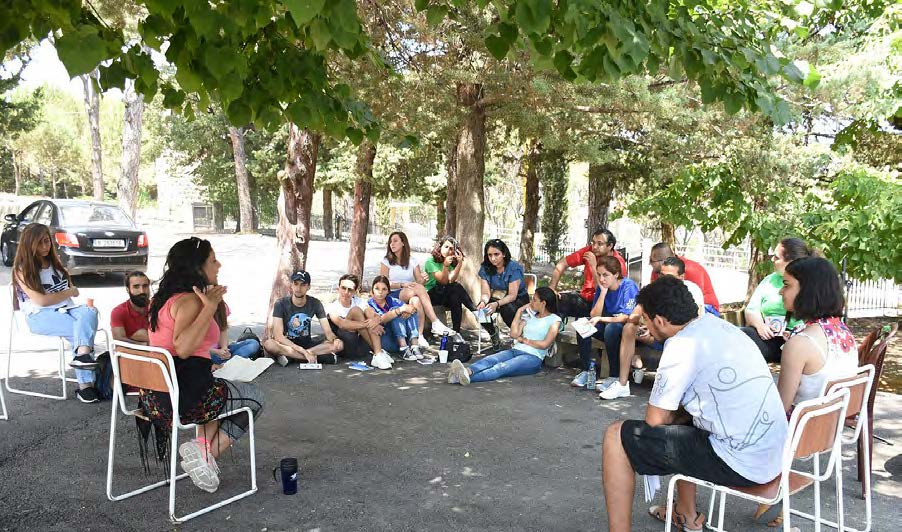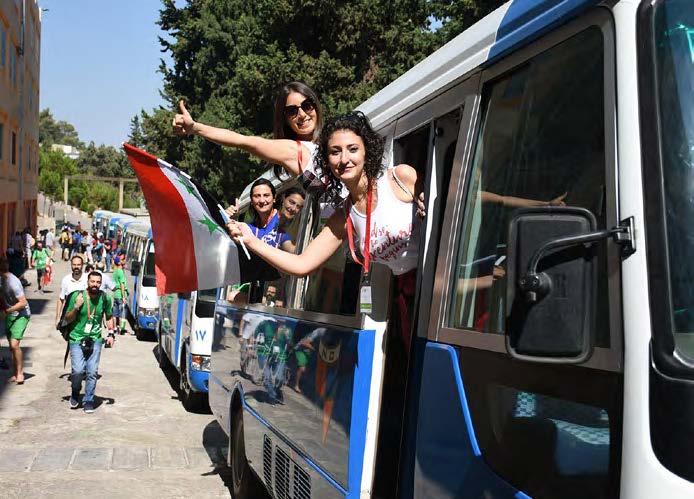
For a week this past summer, Regional Youth Days were held in Beirut. The event gathered more than 350 young Christians from the Middle East. Father Gabriel Khairallah, a Franco-Lebanese Jesuit in charge of the project, tells us about it.
By Claire Riobé
At the beginning of the Youth Days, what was the mood of these young Christians from the Arab world?
In fact, it was quite a mix. There was a sense of insecurity among many young people, linked to the fact that they know they are a minority in countries where Islam is the majority, and where a current of this religion is becoming radicalized. So young people wonder how they're going to live with it.
Other young people, a minority, said instead, "This is my country, and I want to build a future here with others". They are the same people who said, "Even if I had the opportunity to leave, I would think twice. It's the same everywhere, we know that there are also crises in the West; so finally, it's better to stay at home and take the bull by the horns."
And then in other young people, there was a fear of the future. They said they wanted to stay [in the Middle East] but wondered what the Church could propose to them, what form of government their state would take, what place they would be able to live in with dignity. They realized that their future was completely unclear, even in the West, and wondered what they would be able to build. And what they were often told was that the future would be what they wanted to do with it. Some wanted to take part in establishing their history, others wanted to but were skeptical, others were discouraged.
What did they expect from this gathering?
Many wanted to get to know each other to try to forge links as Christians in the Arab world, because they realized that they were really fragmented in the region. These Youth Days were an opportunity to meet and understand, for example, how one lives with Islam in each country, what is the relationship with the state, and how each young person lives as a citizen in his country.
And then young people were looking for a Church that offers them possibilities. I felt that they questioned the institutional church. Is the Church only an institution that concerns itself with power, that has a comfortable bourgeois clergy, or is it the Church of the People of God, which participates entirely in planning a future? Many young people want to take their place in the Church and to get out of the clerical mode. It is a bit ambiguous because at the same time that they are in a certain sense revolting against the institutional church, the Church gives them a sense of identity and a sense of security.
The theme of the meeting was "Your peace depends on their peace". Should young people be asked to leave aside the past to build peace?
Let's look at the context in which this phrase was said. When the people of Israel were deported to Babylon, the prophet Jeremiah spoke these words: Your peace will depend on their peace (Jr 29:7) - that is, "your peace will depend on the peace of the enemy." Imagine the people of Israel listening to this and being told that, even if they are in exile, even in deportation, they must be an agent of peace. It's very strong, you realize how disturbing the biblical word is, how harsh it is. And it was no more bearable at that time than it is today.
We are not asking young people to ignore the past. On the contrary, we are asking them to reread their past in a true way and to draw conclusions from that, so that they know how to read the present and build the future for their children. Because, in the collective unconsciousness, we often tend to exaggerate the past. In Lebanon, we have experienced war but we have not learned a lesson from that. So I want to say to young people, "Don't make the mistake my generation made."
Did you feel that Arab youth were ready for this peace?
Yes honestly the majority is ready for this, which even pleasantly surprised me. I've never heard defeatist language, a "what's it for," a skepticism, honestly. I'll give you an example. During a conference, a speaker asked the young people: "Why do you want to go abroad? There is nothing to be envied in France, there, the family no longer exists, there are no more values, etc." And the young people turned against him, asking him what right he had to come among them and demonize the West. These young people, who had never set foot in France, did not want to hear a speech that demonized others. Given this reaction, I thought, well, there's really something going on. Yes, the majority of young people was ready to hear about peace, about openness; and this was a real surprise [for me].
How can we make them want to become agents of peace?
By giving them possibilities. And that was the purpose of the Youth Days: to tell them that it is up to them to take control of their future, to say they are called to become players. By telling them, "The Church is also you." A young man from Aleppo said, "You know, that's nice, but with us the priest controls everything. Everything has to go through the priest." That is a problem. We also have to ask ourselves, here in the Middle East, how we can gradually push the Church to become less clerical. We have to leave room for young people, and we priests should not be afraid to let go of our power and to share it with them! Let's stop treating young people like children.
What do you and these young people base your hope on?
We base our hope, quite simply, on Christ and on the Resurrection of Christ. And I base my hope (I distinguish between hoping in and hope) on each of these young people; and in the Church, too, as an institution and the people of God (...). As St. Paul said, when he was hunted down and put in prison, "Who can separate us from the love of Christ?" Death? No. Nothing can separate us from the love of Christ.” (Rm 8:35-39)
What do you say to young people who want to emigrate anyway?
It is not easy for me to answer that question. I myself had the chance, since my family had dual nationality. And today I see all the advantages of having a French passport. What can I tell them? You know, as a university professor, I encourage my students to leave because traveling opens the mind. I ask these young people, on one hand, not to idealize West and, on the other hand, not to cut ties with their native roots. I tell them to go and see the western Church, which is very different from here. The French Church, for example, is a Church that struggles with secularism, and may be threatened by closure. I tell my students to go and look at everything that happens there and not to be idealistic. All the pedophilia scandals, for example, shock them a lot: they do not promote the freedom of the press against the clergy, because in the Middle East pedophilia within the Church is a taboo subject. So I tell them, "You want to go, go! But make sure it's not out of fear."

Departure by bus to the experiments (group service experience). On the way. Departure by bus to the experience (an experience of service to one another).
What was the mood of the young people on their return?
To tell the truth, they came back rejoicing and consoled. The young people were more than happy, they were really comforted. They came back moved by this experience of Church that went beyond institutional boundaries; moved to have seen that they can party, dance, share and speak without fear having the last word.
Recentralization of the WYD
Young Christians in the Arab world lack opportunities to meet, to celebrate their faith and to discuss issues affecting them. They feel the need for a spiritual and theological dialogue that authentically expresses their situation. It is in this spirit that the Regional Youth Days were born in 2006. The 2019 gathering in Lebanon is the 5th, after Egypt in 2006, Syria in 2009, Lebanon in 2012, and Egypt again in 2015.